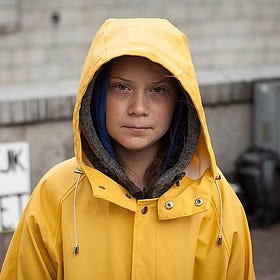Autism and Its Abusers - Belated Post-mortem
Why make a (potentially) risky piece about autism at all?
Back in 2021, I submitted a piece about autism and how it’s been exploited to Areo Magazine. Though written when climate activist Greta Thunberg still made frequent headlines and James Damore’s claim to infamy was still relatively fresh in the online conversation, it’s easy to just say that much of what was written still holds up.
That wouldn’t suffice, however. Besides, why make a (potentially) risky piece about autism at all?
Autism and Its Abusers: The Contrasting Cases of James Damore and Greta Thunberg
Disclaimer: This article was originally posted on Areo Magazine on October 1, 2021. This has been republished in light of the publication shutting down business operations on November 6, 2023. In July 2017, engineer James Damore was fired for writing an internal memo entitled “Google’s Ideological Echo Chamber.” Although the memo offered ideas on how to …
Certainly, the fates of the two people covered in the piece couldn’t be any more different. In the case of Damore, he appears to have kept a low profile on social media. While his name still tends to pop up in examples of corporate censorship and as an “Alt-Right” boogeyman for political websites like RationalWiki, his current predicament may as well be the best he could hope for. At the very least, and given the circumstances surrounding his since-dropped lawsuit, he’s free to move on with his startup career without either side of the culture wars using him. So long as he keeps his head low.
The same can’t quite be said of Thunberg. While her “15 minutes of fame” has arguably come and gone, she’s continued to make headlines for her activism, with both her youth and autism lauded as exemplary. Yet following her decidedly partisan stance over the Israeli-Palestinian conflict, the tone has turned far more divisive. Her having Asperger’s Syndrome, as reported by Le Monde on November 19, 2023, didn’t spare her from intense scrutiny from many in Israel and even among fellow climate activists. In particular, the blue octopus plushie on her shoulder, which according to Thunberg "is a tool often used by autistic people as a way to communicate feelings", has been reinterpreted by some as an antisemitic dog whistle, referencing old Nazi propaganda of an insidious Jewish kraken.
Some outlets like Rolling Stone have downplayed the controversy, while sites like The Guardian continue to give her supporters (and Thunberg herself) a platform for their activism. Yet regardless of one’s stance over the conflict, even these efforts have betrayed how the issues discussed in the 2021 Areo article remain as poignant as ever. So long as people with autism are seen as upholding whatever’s deemed the “right” causes in the eyes of ideologues and journalists, they’re seen as useful enough to defend. The moment they don’t? They’re as expendable as lolcows, their own identity used against them, implicitly or otherwise.
This by no means exempts neuroatypicals from criticism, nor pathologizes them. Nonetheless, when the discourse around them has grown more divisive, if not toxic, this couldn’t come at a worse time. It’s bad enough that in the developed world, even terms like neuroatypical and autism have become battlegrounds, exploited by both those capitalizing off victimhood and others who view them as degenerate blights on society. In countries like the Philippines, where autism both is little understood and has been neglected for so long that it’s begun alarming the government into doing something in spite of that, these are even further exasperated. With how Filipino culture itself has an unfortunate penchant for crab mentality and gossiping, it’s little wonder this topic can be risky.
Maybe it’s because I’ve known people with autism, and they certainly want to be seen as people, as functioning members of society rather than an other from it. But one of these days, I’ll come back to this, and more than just being an updated version of the Areo article, it would more directly tackle that inconvenient canard: what then for people with autism, and where next?
Surely there has to be more options for them than to lay low and know their place, be a (conditional) media darling for the moment, or be a conduit for the worst in people. Guess I’ll find out.




